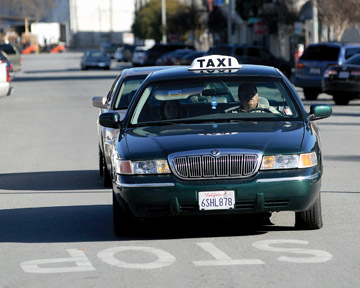In far too many instances, city officials in Hollister have gone to absurd lengths by impeding a free flow of commerce.
The city at last month’s council meeting, though, reversed course on a long-held travesty that allowed council members to decide on the necessity of applicants for new taxi businesses.
Officials on Nov. 19 eliminated a provision in Hollister’s taxicab ordinance that called for council members to weigh the “convenience and necessity” of new cab operators. It meant that any time a new taxi company applied to do business in Hollister, the council would vote on whether the additional competition was necessary.
Not that it should matter from a strictly capitalistic perspective, but this isn’t New York City or Chicago. Hollister has just 35,000 people and has suffered from the Great Recession more than most places throughout the nation. In other words, there is no logical reason to consider restricting the number of taxicabs on our streets or interject in a state of natural competition. It is not as if downtown Hollister is overrun with cabs and angry, hailing shoppers – which wouldn’t be such a bad thing for the ailing merchants here.
Although the council has approved new applications in recent years, the provision allowed for unreasoned debate on two occasions, once in 2009 and again earlier this year, when Yellow Cab and LTD Taxi submitted respective applications to operate here. Fortunately, though, the council approved both petitions, in a 3-2 vote the first time (council members Pauline Valdivia and Doug Emerson dissented) and 4-1 the second time (Valdivia was the lone dissenting vote).
Instead of focusing on how to restrict new businesses and play puppet masters with commerce, city leaders should do what they can to encourage new entrepreneurs and help current businesses grow. Though their decision was a long time coming, council members corrected an injustice and deserve credit for doing so.
The “convenience and necessity” provision served one purpose – allowing elected officials to maintain a power they were never intended to hold by deciding which businesses should have the opportunity to succeed or fail.
It is good to see the city going down this road because the taxi ordinance was just one example where local government officials have overseen operations that interrupt or harm private sector operations. The county transit agency’s subsidized Dial-A-Ride program that competes with the taxi industry comes to mind, as does the city’s failed effort to sell biker rally T-shirts in 2008.
Incidentally, the council at last month’s meeting also broached the topic of handing over management of the Veterans Memorial Building, which burdens the taxpayers and the private sector economy, to local veterans groups.
Taxpayers not only subsidize the building to the tune of $75,000 annually – but residents also financially support an operation that directly competes with many wedding and event-based businesses in Hollister, San Benito County and elsewhere in the region.
It is inappropriate and must stop, and reflects the type of bizarro, government-centric attitude toward commerce that got us into this dire mess.
At least when it comes to taxis, we are on the road to recovery.









